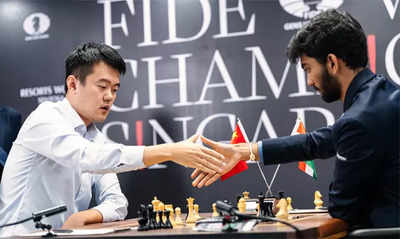
The World Chess Championship battle between the challenger from India, D Gukesh, and the title-holder from China, Ding Liren, has gone down the wire. After 13 games, the match is on tenterhooks at 6.5 points each, with just one game left to be played in Singapore.
Game 14 is scheduled for today (December 12), but if it fails to decide the winner, the Championship will move to tiebreakers, which is the reigning champion’s stronghold. And the 18-year-old Gukesh would, thus, want to avoid that and become the youngest world champion on Thursday itself.
LIREN HOLDS SLIGHT ADVANTAGE
The Chinese Grandmaster holds the edge heading into the decisive Game 14 as he starts with white pieces, but he would be equally confident of pulling it off in the tiebreakers because of his better record in rapid chess.
In the classical format, which is used for the 14 Championship games, Gukesh is currently ranked 18 places higher than Liren. The Indian is ranked 5th and Liren 23rd. But tables turn dramatically when one looks at the rapid chess world rankings, which has the Chinese at No. 2, while Gukesh languishes at the 47th spot.
Gukesh likes to take time before making a move on the board and gets found out in faster formats — rapid and blitz.
HOW THE TIEBREAKER WORKS
The time-controlled tiebreaker will be required only if Game 14, too, ends in a draw and the players share the spoils once again.
In case the tiebreaker is required, it will involve four games played in the rapid format, where each player gets 15 minutes with a 10-second increment for every move. The first player to reach 2.5 points will be crowned the champion.
But there can arise a situation where even the four rapid games fail to end the deadlock.
In such a scenario, the tiebreaker moves to two mini rapid games. The time-control here will allow 10 minutes to each player with a 5-second increment for every more. The placer who scores 1.5 points first, wins.
If that too fails to decide the winner, the tiebreaker will move to two blitz chess games. Here, too, Liren stands way higher (No. 6) than Gukesh (No. 85) in world rankings. The time-control in blitz games shrinks further to 3 minutes for each player with a 2-second increment for every move. This involves a race to 1.5 points — the first to reach that mark wins the title.
The sudden-death blitz games come into play if the deadlock continues. It follows the same format as the above-mentioned blitz games with time-control of 3 minutes and 2-second increment for every move.
The tiebreaker rounds, if required, will be played on Friday.




